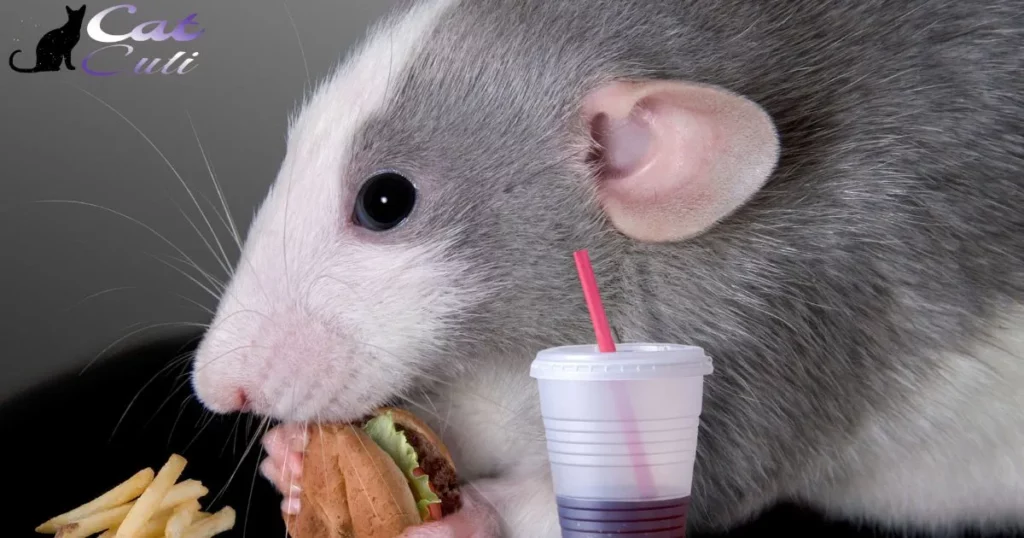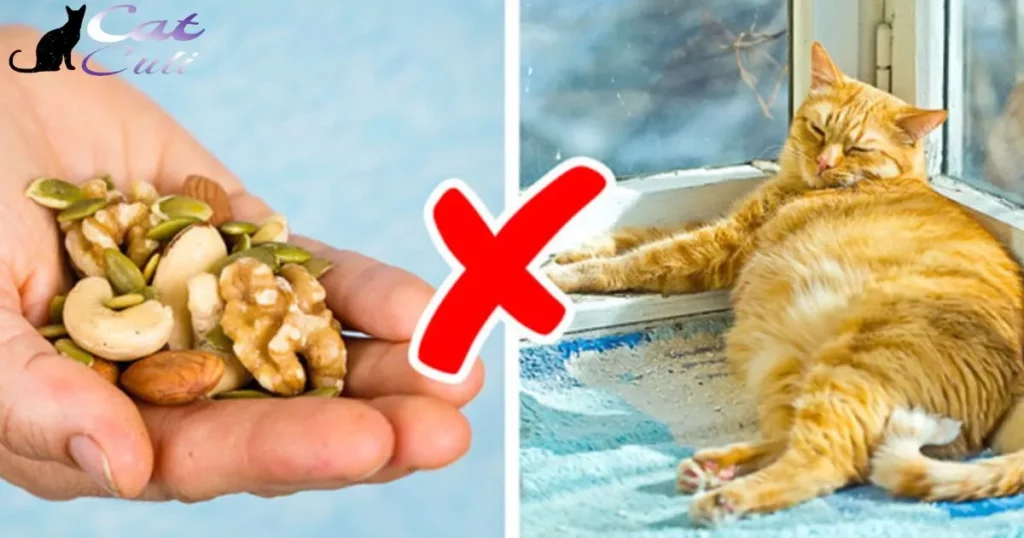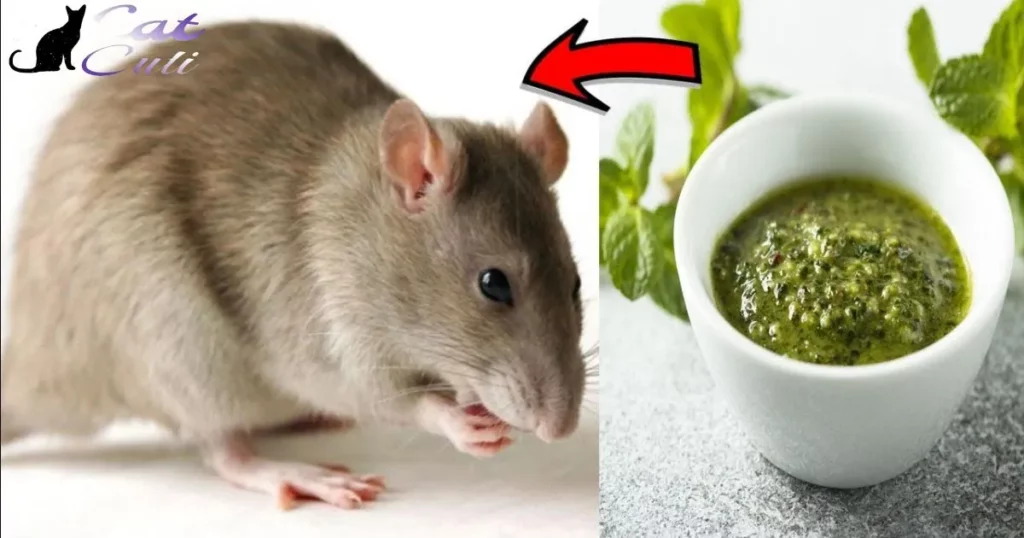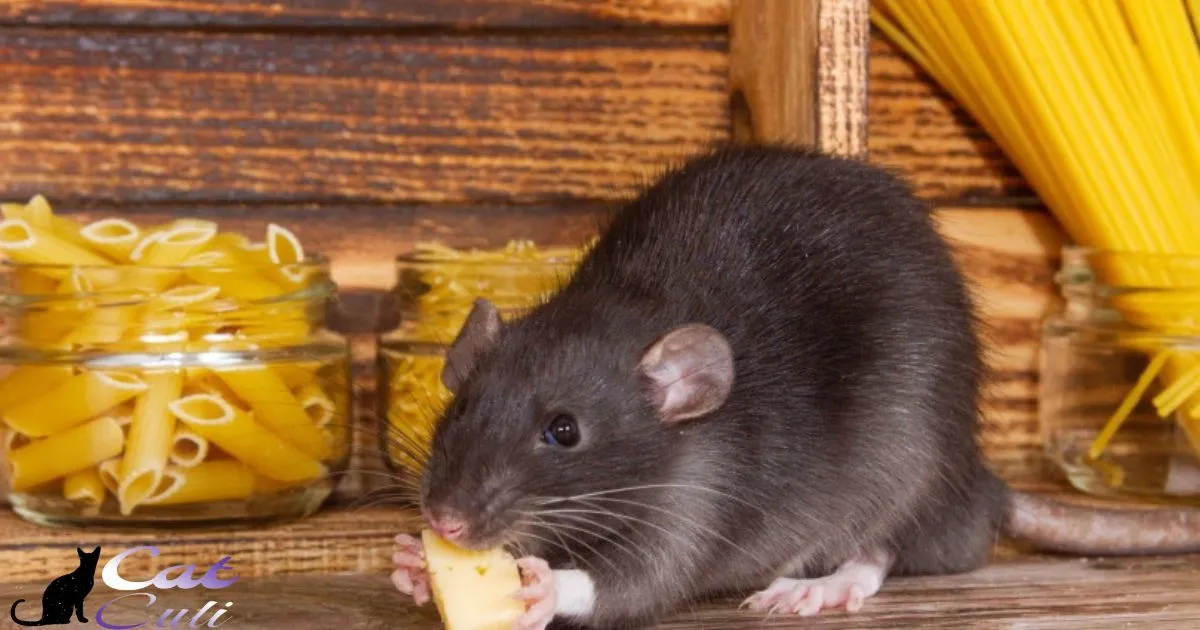Rats can eat cat food as it contains nutrients they need. It’s not ideal as their primary diet. Some cat foods might be too high in protein and not balanced for rats. It’s better to provide them with food specifically made for rats to ensure their proper nutrition.
Can rats have cat food Dive into this intriguing topic to uncover whether our small rodent pals can nibble on the same meal as our feline companions. Explore the nuances and considerations surrounding this question to better understand what’s best for these critters’ health and nutrition.
It’s important to note that while rats can eat cat food occasionally, it shouldn’t be their main diet. Cat food lacks certain essential nutrients for rats and might contain excessive protein. For optimal health, it’s best to offer rats food specifically formulated for their dietary needs. Stay with us to learn more about suitable diets for these small, intelligent creatures.
What Is Cat Food Made Of?
Cat food typically consists of a blend of meat, grains, vitamins, and minerals. Manufacturers use ingredients like chicken, beef, or fish as protein sources. Grains such as corn or rice serve as fillers and a source of carbohydrates. These components are mixed and processed into various forms like kibble or wet food to create a balanced diet for cats.
The meat in cat food provides essential amino acids for muscle health, while grains offer energy through carbohydrates. Added vitamins and minerals ensure a complete and balanced meal for a cat’s overall well-being. Understanding the ingredients in cat food helps pet owners choose the most suitable diet for their feline companions.
What Kinds Of Food Should A Rat Eat?
They enjoy munching on oats, brown rice, and small amounts of whole grain pasta. Fresh veggies like broccoli, carrots, and leafy greens are great for their health and should be a regular part of their meals. Offering occasional fruits such as apples or berries can be a tasty treat for these intelligent rodents.
Proteins like cooked chicken, eggs, and occasional small portions of lean meats are good for rats. It’s crucial to avoid high-fat and sugary foods as they can lead to health issues. Providing a diverse range of foods ensures rats get the essential nutrients they need for a healthy and balanced diet.
Can Rats Eat Wet Cat Food?
Rats can eat wet cat food, but it’s not their best option. Wet cat food often contains high levels of protein and might lack the necessary nutrients rats need in their diet. It’s okay as an occasional treat, but relying on it regularly could lead to nutritional imbalances for these small rodents.
When considering whether rats can have wet cat food, remember that a balanced diet is crucial for their health. Opt for food specifically designed for rats to ensure they receive the right nutrients in appropriate proportions. Wet cat food isn’t the ideal choice for meeting the dietary needs of pet rats in the long term.
What Kinds Of Protein Can A Rat Eat?
Rats can consume various protein sources, such as cooked chicken, turkey, or beef. These meats offer essential nutrients like protein and amino acids that contribute to their overall health. Eggs, tofu, and cooked beans are also suitable protein options for rats, providing them with necessary sustenance.
Nuts and seeds like almonds, walnuts, and pumpkin seeds are other protein-rich choices for rats. These should be given in moderation due to their high fat content. Providing a diverse range of protein sources ensures a balanced diet for these intelligent and inquisitive creatures, supporting their well-being and vitality.
What Happens If Rats Eat Cat Food?

When rats eat cat food, they might experience digestive issues due to the high protein content. Their bodies might struggle to process this excessive protein, leading to discomfort and potential stomach upset. The imbalance in nutrients could affect their overall health, causing deficiencies in vital elements essential for a rat’s well-being.
The high fat content in cat food, intended for felines’ energy needs, can result in weight gain and related health problems for these smaller rodents. In essence, while occasional nibbles might not pose immediate harm, a consistent diet of cat food isn’t suitable for a rat’s health and should be avoided to maintain their well-being.
Can You Feed Your Pet Rat Cat Food?
While rats can nibble on cat food occasionally, it lacks essential nutrients vital for their health. Cat food often contains excessive protein, unsuitable for rats’ nutritional needs. Groundhogs eat cat food occasionally as a treat due to their less sensitive digestive systems. Opt for specially formulated rat food to ensure your furry friend gets a balanced diet with the right nutrients.
Choosing the right food for your pet rat is crucial. While it’s possible to offer them cat food as an occasional treat, it shouldn’t be their primary meal. Rat-specific food ensures they receive the necessary vitamins and minerals for their well-being, promoting a healthier and happier pet rat in the long run.
Is Cat Food Safe For Rats?
Cat food is generally safe for rats to consume occasionally, but it’s not an ideal or complete diet for them. Cat food often contains high levels of protein, which can be excessive for rats and lacks certain essential nutrients necessary for their health.
Can Rats Eat Cat Food In A Pinch?
In emergencies or occasionally, rats can consume cat food without immediate harm. However, it’s crucial to remember that cat food does not meet all the dietary requirements for rats. Rats need a well-balanced diet specifically formulated for their nutritional needs to maintain good health.
What About Dog Food?
Dog food, like cat food, is not suitable as the primary diet for rats. While rats can nibble on dog food occasionally without causing immediate harm, it’s not nutritionally complete for them. Dog food lacks specific nutrients necessary for rats’ health and well-being. Opting for food formulated specifically for rats is the best choice to ensure their proper nutrition.
What Should The Ideal Rat Diet Be Composed Of?
The perfect rat diet consists of a mix of high-quality pellets, fresh veggies, and occasional fruits. Rats thrive on a balanced diet rich in protein, so pellets designed for rats work great. Pair these with veggies like broccoli, carrots, and leafy greens to cover their nutritional needs.
It’s crucial to avoid relying solely on commercial seed mixes as they lack essential nutrients. Instead, prioritize pellets and fresh foods to ensure a well-rounded diet. This variety helps prevent nutritional deficiencies and keeps your rats healthy and happy.
- Fresh Fruits And Vegetables: Rats benefit from a variety of fresh produce like broccoli, carrots, and leafy greens, offering crucial vitamins and minerals in their diet. These should be a significant part of their daily intake to maintain their health.
- High-Quality Rat Pellet: Specially formulated pellets designed for rats serve as a primary source of balanced nutrition. These pellets are crucial for meeting their dietary needs and should form the base of their daily meals.
- Treats: Treats, such as small portions of fruits or nuts, should be given sparingly. These are used as rewards or occasional snacks to avoid upsetting the balance of their diet.
Health Risks Of Feeding Rats Cat Food
Feeding rats cat food poses health risks due to its high protein content, unsuitable for their dietary needs. This food lacks essential nutrients vital for a rat’s well-being, potentially leading to nutritional deficiencies and health problems. Rats consuming cat food regularly might suffer from imbalances, impacting their growth and overall health.
Such a diet can cause obesity and organ strain in rats, affecting their liver and kidneys. It’s crucial to avoid relying solely on cat food for rats, opting instead for specially formulated rat diets. Prioritizing these tailored foods helps maintain a rat’s health, ensuring they receive the necessary nutrients without risking potential health complications.
Protein Toxicity
When animals consume excessive protein, it can lead to protein toxicity. This condition occurs when the body struggles to process an abundance of protein, potentially causing kidney strain and other health issues.
Fat Accumulation
Feeding animals a diet high in fats can lead to fat accumulation within their bodies. This accumulation might result in obesity, affecting their overall health and potentially causing various health complications.
Nutrient Deficiencies
Inadequate diets can result in nutrient deficiencies, lacking essential vitamins and minerals vital for an animal’s well-being. Such deficiencies can lead to various health problems and impact the animal’s growth, development, and overall health negatively.
Reasons Why Cat Food Shouldn’t Be Given To Rats

Cat food isn’t suitable for rats due to its high protein content, which exceeds their nutritional requirements. Feeding rats cat food might lead to health issues like obesity and kidney problems.
Cat food lacks certain vitamins and minerals vital for a rat’s health. This imbalance can result in deficiencies, affecting their growth and overall vitality. Offering rats their specialized diet ensures they receive the necessary nutrients and helps prevent potential health complications down the line.
Protein Content
It’s a crucial component for growth, repair, and overall body function. In cat food, protein content tends to be relatively high, as it caters to a carnivorous diet. However, for rats, excessive protein intake, such as that found in cat food, can lead to health issues like kidney strain and obesity.
Fat Content
Fat content in food indicates the proportion of fats present in the diet. Cat food often contains moderate to high levels of fat, necessary for a cat’s energy needs. However, for rats, too much fat intake from cat food can contribute to weight gain and potential health complications.
Vitamin and Mineral Content
Vitamins and minerals are essential nutrients required for various bodily functions and overall health. While cat food may contain some vitamins and minerals, it might lack specific ones necessary for rats. Rats need a diet rich in certain vitamins like vitamin C and minerals such as calcium to prevent deficiencies and support their growth and immune system.
When Is It Okay To Feed Wet Cat Food To Pet Rats?
Feeding pet rats wet cat food can be okay occasionally, but it’s crucial to be cautious. Check the cat food’s ingredients to ensure it doesn’t contain harmful additives or excessive protein. Always provide a balanced diet designed for rats to meet their specific nutritional needs. Introducing wet cat food to pet rats sparingly, alongside their regular diet
When considering offering wet cat food to pet rats, focus on moderation and quality. Opt for cat food with simple, natural ingredients that align with a rat’s dietary requirements. Supervise their intake and prioritize a rat-specific diet to ensure they receive essential nutrients necessary for their well-being.
Help Underweight Rats Gain Weight
Helping underweight rats gain weight can involve providing a balanced diet rich in proteins, healthy fats, and carbohydrates. Introducing high-calorie treats occasionally, such as nuts or seeds, can aid in their weight gain process.
Occasional Treat For Enrichment
Occasional treats for enrichment purposes can include small portions of fruits, vegetables, or specially formulated treats for rats. These treats should be given sparingly alongside their regular diet to prevent obesity and maintain a healthy weight.
Recovery From Illness
During recovery from illness, it’s essential to consult a veterinarian for a proper diet plan tailored to the rat’s specific needs. This may involve offering easily digestible foods, supplements, or specialized diets to support their recovery and regain lost weight.
Tips To Keep Rats Away From Cat Food
- Store cat food in sealed containers to prevent easy access for rats.
- Place feeding stations on elevated surfaces, out of rats’ reach.
- Keep feeding areas clean by promptly cleaning up spills and removing uneaten food.
- Consider using traps or deterrents around feeding spots to discourage rats.
- Regularly inspect feeding areas for signs of rats and take immediate action if needed to maintain a rodent-free environment.
Drawbacks Of Feeding Too Much Wet Cat Food To Rats
Feeding rats excessive wet cat food can lead to health issues. The high moisture content in wet cat food might cause digestive problems for rats, like diarrhea. Also, it lacks some vital nutrients that rats require for a balanced diet, potentially leading to deficiencies.
Too much wet cat food can result in weight gain for rats. The higher fat content in some wet cat foods might cause obesity in these little creatures. Always ensure a balanced diet tailored specifically to a rat’s nutritional needs to keep them healthy and happy.
What Are The Benefits Of Cat Food For Rats?
| Benefits of Cat Food for Rats |
| Nutrient Intake: Cat food may provide certain essential nutrients like protein and vitamins. |
| Convenience: Cat food might be easily accessible and convenient to use as a supplementary food source for rats. |
| Palatability: Some rats may find cat food flavours appealing, making it easier to introduce into their diet. |
| Variety: Offering cat food occasionally can add variety to a rat’s diet, preventing monotony. |
Please note that while cat food can offer certain benefits, it’s important to balance it with a diet specifically formulated for rats to ensure they receive all necessary nutrients for optimal health.
What Are The Alternatives To Cat Food For Rats?
Rats thrive on a variety of foods beyond cat food. Opt for a balanced diet comprising fresh fruits and veggies like apples, carrots, and leafy greens. Grains such as oats and rice are great too. Homemade mixes with seeds, nuts, and some protein sources like cooked eggs or small amounts of chicken can be healthy alternatives.
Furthermore, commercial rat pellets provide essential nutrients, ensuring a well-rounded diet. These pellets are specifically formulated to meet a rat’s dietary needs, offering a convenient and balanced meal option. Experimenting with different foods can keep these little companions happy and healthy.
What To Feed Rats When Out Of Rat Food

When you run out of rat food, you can offer rats various alternatives from your kitchen. They enjoy fresh fruits like apples, bananas, and berries. Veggies such as carrots, broccoli, and spinach are also great options for them. You can provide small amounts of cooked grains like rice or pasta.
Nuts and seeds like almonds or pumpkin seeds make good occasional treats. Avoid feeding them sugary or salty foods as these can be harmful to their health. Always prioritize their nutritional needs and offer a balanced diet even when you’re temporarily out of rat-specific food.
Can Rats Eat Dog Biscuits
Rats can eat dog biscuits as an occasional treat. These snacks contain grains and proteins that rats can digest. However, dog biscuits lack some vital nutrients that rats need for a balanced diet, so it’s better to offer them food designed specifically for rats to keep them healthy and thriving.
While dogs and rats might share a liking for some foods, it’s crucial to ensure rats get a diet tailored to their nutritional requirements. Dog biscuits, while safe in moderation, shouldn’t be the mainstay of a rat’s diet due to the differences in their dietary needs. Providing rats with a diet formulated for them ensures they receive the essential nutrients for their well-being.
FAQ’s
Is it OK to give rats cat food?
Rats can eat cat food occasionally, but it lacks essential nutrients for them. It’s not ideal as their primary diet.
Will cat food attract rats?
Cat food’s scent might attract rats due to its strong odour. Store cat food securely to avoid attracting rodents.
Can cats eat rat food?
Cats can eat rat food, but it lacks necessary nutrients for their optimal health. It’s not suitable as their main diet.
Can rats have dog food?
Rats can consume dog food, but it lacks specific nutrients they need. It’s better to provide them with rat-formulated food.
Conclusion
In conclusion, the question Can rats have cat food? comes with considerations. While rats can nibble on cat food occasionally, it’s not their best dietary option. Cat food lacks essential nutrients vital for a rat’s health and might have excessive protein content. For optimal nutrition and well-being
Understanding that rats have specific dietary needs is crucial. While cat food might seem like a quick option, it’s not the most suitable choice for these intelligent rodents. Prioritizing their health by offering food designed explicitly for rats ensures they get the necessary nutrients to thrive.








